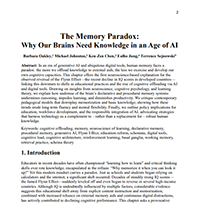
The Matter of Facts
"The Memory Paradox: Why Our Brains Need Knowledge in an Age of AI" by Barbara Oakley, Michael Johnston, Ken-Zen Chen, Eulho Jung, Terrence Sejnowski. Preprint of chapter in forthcoming book The Artificial Intelligence Revolution: Challenges and Opportunities (Springer Nature, 2025)
This chapter from the forthcoming book The Artificial Intelligence Revolution: Challenges and Opportunities zooms out beyond the "AI in the classroom" discourse to offer a powerful, compelling, and well-argued vision for what and how to teach in our technology-addled age. Rather than seeing the changes wrought by chatbots and generative AI tools as something new, the authors trace important continuities with the use of technology to offload memory and content knowledge. They suggest that the move away from deep, factual, content knowledge in favor of critical thinking and constructivist approaches in the age of information abundance – what the authors dub the "look it up" mindset – led educators to "[miss] how stored knowledge builds the mental foundation needed for advanced thinking." By further examining the distinct roles of declarative and procedural memory, the authors argue that genuine expertise and intuition emerge from the cultivation and internalization of foundational knowledge, not just the development of critical thinking skills with passive externalization of facts. All of this points towards a future in which "the synergy of human cognition and machine capability will define successful education," but in that future, these authors believe that facts matter both as content knowledge and, more importantly, as the essential structure for developing robust mental models and the schemata of deeper critical and reflective thinking.


